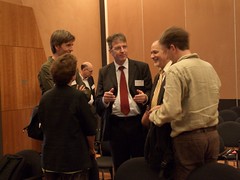
Last Thursday Charles Severance was one of the keynote speakers at the "Over de grenzen van de ELO" conference, where Stanley already reported about in this blog. His official announcement of the 7th Sakai conference to be held in Amsterdam, next June, was great news!!
But there was more news than that of course. I will share two news items with you. I have some more, but i am not able to share them here.
The first newsitem newsworthy item was spawned by Keith Russell of the University of Utrecht (mentioned earlier on this blog), who raised the question of anonymous use of Sakai during the Q&A session with Chuck. The answer by Chuck was very clear: in the near future it will be possible that (part of) a course or project site can be made public. That is: you could make the Announcements public, so for everyone to read (including Google!), but the rest of your tools in Sakai private (so only for site members). See Jira for more details on Google indexing. This feature would really be an great improvement for Sakai. Actually we have exactly the same problem with our current VLE.
One other newsitem (from the hallways) is that one of the larger institutions for vocational education in The Netherlands will start piloting with Sakai real soon.
If you want to read more on "Over de grenzen van de ELO" conference, please go to Wilfred Rubens (in Dutch) or Marc Dupuis (in English) or Scott Wilson (one of the other excellent keynotes that we were offered!) And maybe Willem van Valkenburg will be ready to share some comment with us, once the VVD congress is over :-)
More pictures at Flickr




